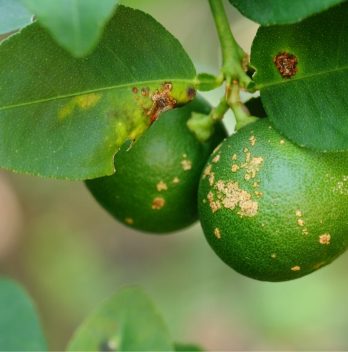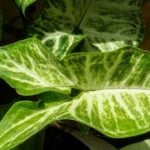If you are struggling to mitigate fungal disease in your garden, one sure solution is neem oil fungicide. Apart from the pesticide job that neem oil does, it can also work as a fungicide and miticide. Therefore, neem oil works three in one! Amazing, right?
Fungi Disease
It can be pretty disturbing when fungi invade your plants. The majority of plant diseases are caused by fungi. You must act fast when you spot any fungi activities in your garden before they spread uncontrollably.
Signs of Fungal Infestation
The first step to battling this fungal disease is to identify the presence of a fungal infestation. Fungal infestation can affect any plant. Here are the signs to look at for when it comes to fungal infestation.
- White Mold: white mold, a fungi infestation, caused by sclerotinia begins to form on your plant leaves and also cause stem rot. It can eventually lead to plant death.
- Powdery Mildew: fungal infestation will cause powdery mildew on your plant leaves.
- Stem Rust: the stem of your plant begins to rust with a fungal infestation.
- Leaf Yellowing and Rust: the leaves start to rust, especially corn leaves. Also, you may notice your plant leaves start to turn yellow. Sometimes your plant leaves may have some brown spot.
- Seedling: your plant seedlings start to dampen.
- Berries: you may notice some bird-eye spot on your berries.
Neem oil as Fungicides Treatments
When you have confirmed fungal infestation in your garden, you can now opt for neem oil as a treatment. Neem oil is an organic fungicide treatment safe for treating fungal infestation as well as protection against subsequent infection.
Neem oil treatment is non-toxic and can be applied to a fruit tree, leaves, stem, and

Apply neem oil every 7 to 14 days as a preventive measure against fungi disease. To effectively treat fungal disease already present, spray neem oil on the affected plant on a 7-day schedule. Do this until the fungal disease is eliminated.
Spray neem oil fungicides in the evening time or early morning only. Avoid spraying neem oil during the hot periods to prevent the burning of leaves.
Recommended Neem Oil Fungicide
We recommend these neem oil fungicides for your plant:
Garden Safe HG-83179 Neem Oil Extract Concentrate
Garden Safe, a component of neem oil, is a three-in-one product (fungicide, insecticide, and pesticide). It is a safe measure for treating and controlling different fungal diseases such as powdery mildew, white mold, leaf and stem rust, bird-eye spot, tip blight, and so on.Simply mix concentrated garden-safe neem oil with water and spray your plants. Make sure you read the label and follow the instructions for accurate results.
Garden-safe neem oil can be applied to flowers, roses, houseplants, and ornamental trees. It can also be applied to vegetables, fruits, and shrubs. With Garden Safe, you can assist your plants and help them grow safely and healthy throughout the growing season.
It can also be used as a dormant spray, protecting your plants throughout the season.
For Organic Gardening, Fungicide, Insecticide, Miticide, Neem Oil For Plants, 10 fl Ounce
Monterey Neem Oil Insecticide, Miticide and Fungicide Ready to Use Spray
Another 3 in 1 neem oil is the Monterey neem oil. There is no need to mix it. It is ready to use; all you need to do is spray Monterey on your plant.Monterey is formulated to prevent and control all kinds of fungi diseases, insects, and mites.
It works well on houseplants, flowers, roses, vegetables, fruits, shrubs, and trees.
Controls Black Spot, Powdery Mildew, Rust, Need…
Pure Zuprime Neem Oil for Plants
Pure Neem Zuprime pure neem oil concentrate offers effective fungicide control on houseplants, flowers, trees, and shrubs.
Apply 3ml to 7ml of neem organic pure oil per quart of water inside a spray bottle and spray your plant. Spray neem oil organic early in the morning or late in the evening to avoid burning the leaves. Ensure you always read the instructions on the label for accurate results.
Neem oil organics can also serve as a dormant spray by protecting your plants throughout the seasons.
100% Cold Pressed Neem Oil, All-Natural Neem Oil Concentrate Leaf Polish for Plants, Pure Neem Oi…
Neem Oil as a Fertilizer: Benefits for Your Garden
While neem oil is primarily known for its pest-repellent properties, it can also offer benefits as a natural fertilizer. Neem oil is rich in nutrients that improve
- Rich in Nutrients: Neem oil contains nitrogen, phosphorus, potassium, and micronutrients that are essential for plant growth. These nutrients support healthier roots, stronger stems, and increased foliage.
- Improves
Soil Health: When neem oil breaks down, it enriches thesoil with organic matter. This improvessoil structure, boosts moisture retention, and promotes beneficial microbial activity, which enhances overall plant health. - Natural Pest Control: One of neem oil’s unique advantages is its dual role. It acts as a fertilizer while also deterring harmful pests like aphids, spider mites, and whiteflies. This reduces the need for chemical pesticides and keeps your garden healthy.
- Slow-Release Properties: Neem oil breaks down slowly, releasing nutrients over time. This provides a steady supply of nutrition to your plants, reducing the need for frequent fertilization.
- Safe for the Environment: Being organic and biodegradable, neem oil is eco-friendly and safe to use around pets, children, and beneficial insects like bees and ladybugs.
Neem Oil as a Mosquito Repellent
In addition to its uses in gardening, neem oil is an effective natural mosquito repellent. Its strong odor and active compounds make it an eco-friendly alternative to chemical repellents. Here’s how neem oil helps keep mosquitoes at bay:
- Natural Insect Repellent: Neem oil contains compounds like azadirachtin, which disrupt mosquitoes’ lifecycles. It repels adult mosquitoes and prevents larvae from developing, reducing their population over time.
- Safe for Skin: Neem oil can be applied to the skin when mixed with a carrier oil, such as coconut or olive oil. When used, it creates a protective barrier that mosquitoes dislike, making it a natural alternative to DEET-based products.
- Long-Lasting Protection: Unlike chemical repellents, neem oil provides durable protection without harmful side effects. It can be reapplied as needed, making it ideal for outdoor activities.
- Environmentally Friendly: Neem oil is biodegradable and non-toxic, making it safe for use around pets, plants, and the environment. It doesn’t pollute water sources or harm beneficial insects.
Using neem oil as a mosquito repellent allows you to enjoy outdoor spaces without worrying about harmful chemicals or constant mosquito bites.
Let’s take a look at some of what we discussed above:
- Neem oil fungicide is a safe organic treatment for various fungal diseases in plants.
- Applying neem oil on all food plants is safe.
- Neem oil works amazingly as an all-purpose insecticide repellant, mite repellent, as well as fungicide treatment.
- You can also make use of neem oil as a dormant spray which will protect your plant all through the seasons.
- Apply neem oil 7 to 14 days as a preventive fungicide, for control measure; apply on a 7 days schedule.
By using neem oil in your garden, you not only nourish your plants but also protect them from pests in an environmentally responsible way.
FAQ: Neem Oil Fungicide
1. What is neem oil used for in gardening?
Neem oil is used as a fungicide, insecticide, and miticide. It helps combat fungal diseases like powdery mildew and prevents pest infestations.
2. Is neem oil safe for edible plants?
Yes, neem oil is safe for vegetables, fruits, and herbs. Just ensure proper dilution and wash produce before consuming.
3. Can neem oil burn plants?
Neem oil can cause leaf burn if applied in direct sunlight or excessive amounts. Apply in the early morning or evening.
4. How often should neem oil be applied?
For pest prevention, apply neem oil every 7-14 days. For active issues, use it weekly.
5. How does neem oil work as a fungicide?
Neem oil disrupts fungal growth by interfering with spore germination, effectively controlling the spread of diseases like rust, black spot, and mildew.








